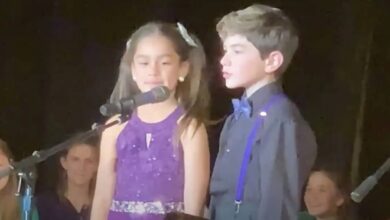Lionel Richie’s Heartfelt “I Am…I Said” Rendition Touches Neil Diamond and Meryl Streep
Lionel Richie’s performance of “I Am…I Said” at the 2011 Kennedy Center Honors is an unforgettable moment in the tapestry of live music, characterized by its blend of tribute, artistry, and heartfelt emotion. This event was organized to pay homage to Neil Diamond, a songwriter whose influence is felt across multiple generations of music lovers. Richie’s choice to showcase one of Diamond’s signature pieces reflects a deep appreciation for the artistic contributions that have shaped the music landscape. As he took the stage, it was clear that Richie aimed to do more than just sing; he sought to tell a story that resonates with the audience, blending personal interpretation with the profound feelings embedded in Diamond’s lyrics.
“I Am…I Said,” released in 1971, stands as an emblematic work within Neil Diamond’s catalog, celebrated for its introspective lyrics that explore themes of isolation and the quest for identity. The song’s capacity to evoke a sense of yearning and longing is a hallmark of Diamond’s songwriting. It weaves together a narrative that many find relatable, one that explores the often tumultuous journey of self-discovery and the quest for acceptance. Richie’s interpretation brought forth these underlying sentiments with a sincerity that touched the heart of the audience, shedding new light on familiar lyrics while simultaneously honoring Diamond’s artistic legacy.
Richie’s musical journey began with The Commodores, a group renowned for blending funk and soul to create a distinct sound that wrangled commercial success and critical acclaim. His evolution as a solo artist showcased his inherent versatility, allowing him to navigate various musical styles deftly. From R&B ballads to upbeat pop tracks, Richie has consistently demonstrated his ability to captivate listeners with his smooth, emotive voice and relatable storytelling. The selection of a Neil Diamond song for the Kennedy Center performance illustrates the interconnectedness of artists and the shared experiences that transcend genre barriers in popular music.
An important aspect of Lionel Richie’s performance was his decision to personalize one of Diamond’s lyrics, specifically referencing his own hometown, Tuskegee, Alabama. This lyrical modification not only infused the performance with Richie’s personal touch but also underscored a key concept in music: that while songs can originate from a specific experience or cultural context, the emotions they convey are universal. Such connections illustrate how artists can forge bonds with audiences, transforming personal histories into shared narratives.
The Kennedy Center Honors event is renowned for recognizing excellence in the performing arts, and the 2011 ceremony was no exception. The evening gathered an esteemed group of honorees and guests, including prominent figures from various artistic disciplines. Among the audience were legends like Yo-Yo Ma and Sonny Rollins, but it was Richie’s performance that captured the essence of the night, eliciting emotional responses and celebrating the spirit of artistry. The atmosphere was charged with a palpable sense of admiration not only for Diamond but also for the tradition of honoring those who have made significant contributions to the cultural fabric of the nation.
The reactions from the audience were noteworthy, with many visibly moved by the depth of Richie’s homage. The presence of celebrities like Meryl Streep highlighted the reverberating impact of the performance, as the room filled with an electric exchange of emotion. Such moments illustrate the power of live music to create communal experiences, drawing individuals together through the shared enjoyment of artistry. The unity and appreciation within the audience acted as a reminder that live performances often transcend personal preferences, fostering connections among all present.
Following this memorable performance, both Richie and Diamond have continued to resonate with fans around the world. Diamond’s eventual retirement from touring in 2018 marked the end of a significant chapter in his storied career, yet his contributions to music remain timeless, cherished by those who have followed his work. Meanwhile, Richie has remained a vibrant force in the music industry, extending his influence through mentorship roles and active engagement with new artists. His role as a judge and mentor on television programs like “American Idol” has allowed him to guide emerging talent, ensuring that the rich traditions of storytelling in music endure.
Richie’s ongoing efforts underscore the importance of legacy and the passing of knowledge to the next generation. He actively demonstrates a commitment to fostering an appreciation for the music that shaped his own career, further extending the reach of songs that capture significant emotional truths. The notion of mentorship in music is paramount, creating pathways for aspiring musicians and connecting them with past legends whose work continues to inspire.
The impact of that Kennedy Center performance lingers as a quintessential example of how music serves as an avenue for shared reflection and connection. Performances like the one Richie delivered transcend the act of singing; they become celebrations of life experiences, friendships, and the hopes and dreams of countless individuals who find solace in the lyrics and melodies of their favorite songs. The interpretative artistry involved in breathing new life into classic pieces showcases the timeless nature of music and its capacity to evolve while retaining its core essence.
In reflection, Lionel Richie’s performance at the Kennedy Center Honors stands as a testament not only to Neil Diamond’s remarkable career but also to Richie’s talent in delivering powerful interpretations. This moment encapsulates the profound ability of music to bridge generational divides and evoke universal feelings, reinforcing the idea that artistry is a communal experience that enriches our lives. Through performances like these, artists like Richie remind us of the extraordinary connections music fosters, encouraging us to celebrate our shared humanity and the journey that binds us all together.





